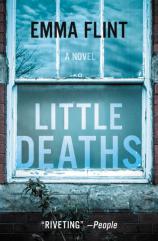Little Deaths
Review
Little Deaths
What a wonderfully dark novel this is. LITTLE DEATHS is one of those rare books that far surpasses its pre-publication expectations. It is a literary mystery/thriller, yes, one that slices in and out of the mores and attitudes of its historical setting --- New York, 1965 --- while evoking a sense of place so perfectly that the here and now appears to be fictitious, however momentarily. It is executed so well from beginning to end that to note this is Emma Flint’s debut work seems to be an almost unnecessary distraction. Flint’s ability to quietly horrify, shock, titillate and mystify soars and resounds from page to page. Yet the book reminds me of those hard-boiled paperback novels that one used to find on the revolving wire racks in drug stores and supermarkets during the era in which the story is set. I have no idea how the author pulled it off, but that’s exactly what she did.
LITTLE DEATHS is told from the perspective of two individuals. The first is Ruth Malone, as complex a character as you are likely to encounter in a novel this year. Ruth is a cocktail waitress who is involved in what promises to be a very bitter custody battle with her divorced husband, Frank, over their two small children. She tries to take care of Frankie Jr. and Cindy while working and engaging in an extremely busy social life, but on one fateful morning, both go missing from their beds. The result is the worst of all possible outcomes when their dead bodies are soon discovered.
"Part mystery, part courtroom thriller, LITTLE DEATHS is far longer and deeper than the breadth of its pages. Book discussion clubs should take special note of this one."
Pete Wonicke, a reporter for a popular but still struggling tabloid newspaper, provides the second perspective. He has the job he has dreamed of --- working for a newspaper in New York --- but after two years he has yet to write that big story, the one that will get him a front-page, top-fold byline. The abduction and murder of the Malone children gives him the opportunity to move forward, particularly when he develops an inside source in the form of the officer investigating the case, who is engaged in what seems to be a predetermined rush to judgment. The investigation focuses almost exclusively on Ruth, whose parenting and other social skills --- or lack thereof --- as well as her almost incessant pursuit of men make her the most likely candidate for the murder of her children in the eyes of the authorities.
At first, Pete is inclined to agree with the direction of the investigation, but his dogged surveillance of Ruth turns into an unhealthy obsession. When she is arrested, Pete becomes determined to prove Ruth’s innocence and, barring that, keep her out of prison. It is a path that will cost him everything he has ever wanted, but he barely flinches. Eventually, the terrible truth about what happened that night will be revealed, although it may be too late for justice to be served.
Emma Flint reminds me in some ways --- particularly during the last third of the book --- of a more elegant and nuanced Erle Stanley Gardner. She presents her story in thin and faint layers that she gradually peels away, revealing the inner psyche of her characters slowly and steadily. Ruth is not an entirely sympathetic character, but as Flint demonstrates, a complex, difficult and unconventional personality does not necessarily make one a murderer, though it certainly is an almost overwhelming element in the rush to judgment against her. The tunnel vision of the investigation is ironic, as is, interestingly enough, the lengths to which Pete will go in order to prove Ruth’s innocence, or at least create reasonable doubt.
Part mystery, part courtroom thriller, LITTLE DEATHS is far longer and deeper than the breadth of its pages. Book discussion clubs should take special note of this one.
Reviewed by Joe Hartlaub on January 19, 2017
Little Deaths
- Publication Date: October 17, 2017
- Genres: Fiction, Historical Fiction, Historical Mystery, Mystery
- Paperback: 320 pages
- Publisher: Hachette Books
- ISBN-10: 0316272485
- ISBN-13: 9780316272483





